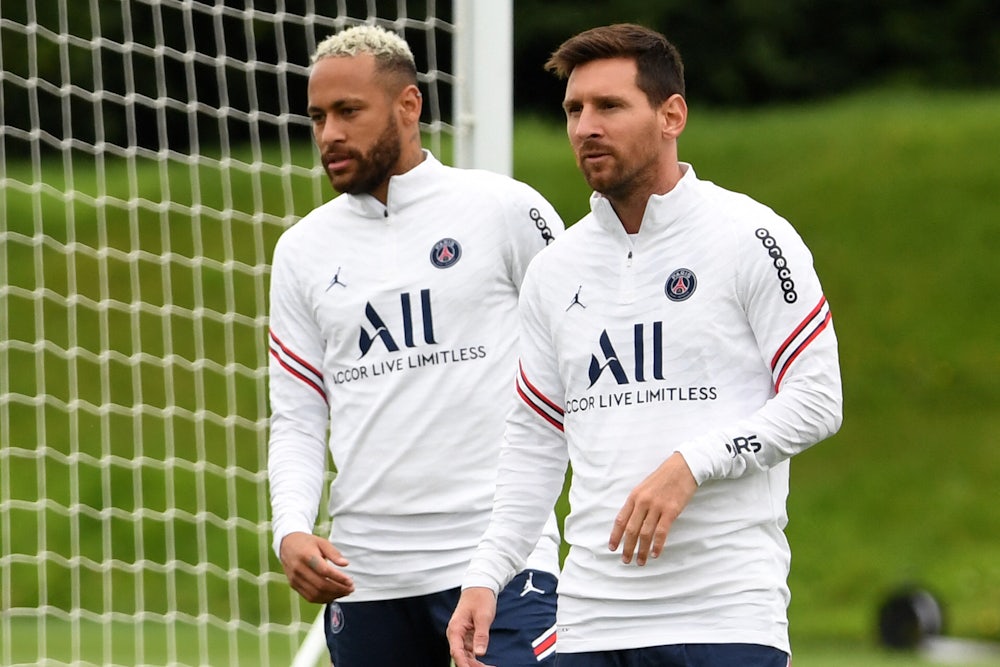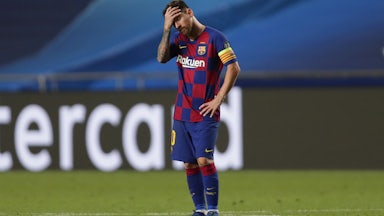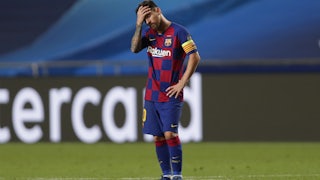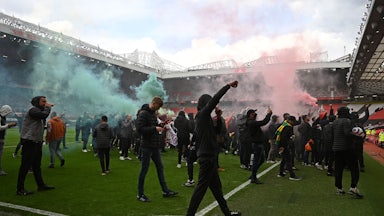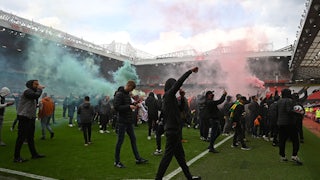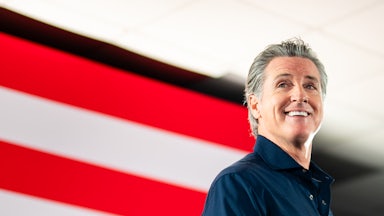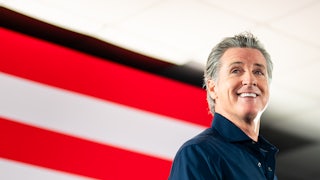For much of August, European soccer appeared to be racing toward a rebalancing that doubled as an existential crisis. Already fantastically unequal, with a handful (at best) of clubs dominating in every country, the continent’s three richest teams—two, Paris Saint-Germain and Manchester City, owned by Middle Eastern countries and the third, Chelsea, owned by a Russian oil billionaire—raced even further ahead of everyone else. Manchester City splashed £100 million on Jack Grealish, a tricky winger with bad hair and big calves who is among the best ball carriers and passers in Europe; they seemed on the verge of paying all that and more for Harry Kane, a goal-scoring machine who stood to shore up the club’s biggest weakness, the lack of a lethal finisher. Chelsea, fresh off a European title and already overflowing with attacking talent, paid £97.5m for Romelu Lukaku, arguably Europe’s best striker. Not to be outdone, Paris Saint-Germain added Lionel Messi, the greatest player in the world and, perhaps, of all time, along with a bevy of other superstars and useful role players. Europe’s richest clubs were playing with Monopoly money and leaving everyone else in the dust.
Over the last few days, that narrative has taken a bit of a hit. Kane announced that he was staying at his team, Tottenham, for “this summer,” after its chairman spurned City’s offers, which were rumored to be as high as £150 million. Cristiano Ronaldo, still a threat at age 36, appeared on the verge of joining Manchester City before he joined his old team, Manchester United. (Whatever Ronaldo adds on the field—and he has seriously declined in recent years—it should be noted that he has been accused of sexual assault and admitted that his alleged victim told him “no” and “don’t do it” repeatedly.)
Paris Saint-Germain’s historic attacking trident—Messi, Neymar (himself the world’s most expensive player), and 22-year-old superstar Kylian Mbappe—may only play one game on the same team and none together. Mbappe is pushing for a move to Real Madrid, the team he has wanted to play for since he was a boy. City, meanwhile, dropped its first game of the season to a Kaneless Tottenham, while Chelsea was held to a 1–1 draw by Liverpool, albeit one helped along by a controversial, if deserved, red card.
This has been the craziest transfer window in recent memory (if not of all time). Yet despite all of this frenetic activity, the larger reality remains unchanged. Covid-19 has accelerated many of the game’s most alarming recent trends, creating a climate in which three teams with bottomless resources seem prepared to dominate soccer for years to come. The ongoing pandemic has ravaged the finances of nearly every team that wasn’t already backstopped by owners with nigh-on unlimited resources at their disposal. Now, as those teams—many of which are relatively new to the sensation of no longer being among the sport’s luxe layer—try to claw their way back from a year of lost revenue (and, in many cases, years of shocking mismanagement), it seems that European soccer’s Big Oil era, a moment years in the making, is on the verge of beginning.
Nowhere is this clearer than in Messi’s move to PSG. Messi is synonymous with F.C. Barcelona, the La Liga team he had played for since George W. Bush’s first term. Thanks to an orgy of spending worthy of Nicolas Cage, Barcelona found themselves in absurd straits: They had hemorrhaged so much money—perhaps as much as half a billion euros last year alone—that they literally could not register Messi, or a handful of other players that they had signed over the summer. Messi wanted to play for Barcelona. Barcelona wanted Messi to play for them. And Barcelona, despite being the most popular and important team in the world, could not sign the most popular and important player in the world. So Messi departed to one of the only clubs that could afford to sign him.
Most of Europe’s older royalty are a shambles at the moment, the pandemic’s ravages compounding the ill effects of years of trying—and often failing—to keep up in a spending arms race being led by teams with bottomless resources. Over the last year, the bottom has fallen out. Barcelona is practically bankrupt. Juventus and Real Madrid, huge global brands and perennial title favorites in their respective countries, aren’t doing much better—though Madrid did find 180 million euros between the couch cushions at the Bernabeu to make an offer for Mbappe.
Manchester United and Liverpool haven’t fallen victim to this decline, but both play in the uberrich English Premier League—which has itself become an ersatz European Super League over the last few seasons. Manchester United may have spent heavily in the transfer window but still lack a competent central midfielder and don’t yet seem poised to challenge for a Champions League title; Liverpool, having tightened their belt due to pandemic losses, have barely spent in the transfer window at all and seem more intent on long-term stability than challenging for silverware. Instead, soccer is dominated by its nouveau riche: three clubs that were (relatively) minor until being bought with oil money.
This outcome was inevitable as soon as European soccer decided that allowing owners with dubious—at best—records was fine, so long as they had money to splash around. Manchester City and PSG are owned by the United Arab Emirates and Qatar, respectively, and both countries use their clubs as a form of soft power, a way of laundering despicable human rights records. If you want to know how crazy European soccer finances are right now, think about this: Mbappe is probably leaving PSG, one way or another. The team can either take 180 million euros for him now or let him walk for free next summer when his contract expires. They may very well choose the latter option because Qatar is hosting the World Cup next winter, so Mbappe’s presence on the team—and the possible Champions League title they’ll contend for with him in the lineup—is good for PSG, and therefore good for Qatar. The few hundred million euros that PSG may fritter away if Mbappe leaves next year for free is just the cost of doing business.
The dispiriting thing is that it’s not at all clear where the sport goes from here. The recently proposed (and quickly scuttled) European Super League was a craven and desperate effort by soccer’s old guard to save themselves—and to make sure that the same dozen clubs compete for titles every year. Many of these organizations have been so badly mismanaged that they don’t deserve saving, regardless of the romantic nostalgia that lingers on their training grounds. Most efforts to limit spending only ends up poaching money from player’s pockets; the financial enforcement from European soccer authorities has been perennially ineffectual, if not corrupt. For years, fans have watched this wayward drift unfold—the European leagues slouching inexorably toward a cynical parody of what was once robust competition. Now, thanks to a global pandemic, the long-awaited reckoning may have arrived.
